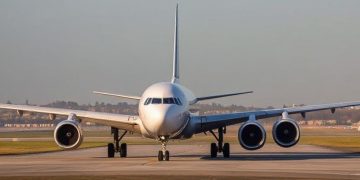China has attributed the suspension of Boeing aircraft deliveries to new U.S. tariffs, claiming the levies have disrupted the international air transport market. The statement from China’s Commerce Ministry expressed concern over the impact of U.S. tariffs on global supply chain stability.
“The United States’ imposition of tariffs has severely affected the stability of the global industrial chain and supply chain,” said a spokesperson for the ministry. “Chinese airlines and Boeing have both been significantly impacted.”
The U.S. has imposed tariffs as high as 145 percent on many Chinese products, with China responding by implementing new tariffs of 125 percent on U.S. imports.
Boeing’s CEO, Kelly Ortberg, confirmed last week that Chinese customers had ceased accepting new aircraft deliveries due to the tariff situation. The company had planned to deliver around 50 aircraft to China in 2025. Ortberg indicated that if the halt persists, Boeing would seek to sell the planes to other international carriers.
In response to China’s decision, U.S. President Donald Trump criticized the move, stating that Boeing should seek compensation from China for not taking the completed aircraft.
The Chinese Commerce Ministry expressed its willingness to continue supporting business cooperation between the two nations and emphasized the need for a stable and predictable environment to facilitate normal trade and investment activities.
Both governments have shown interest in resolving the ongoing trade tensions, but the impact on international business and trade remains a subject of concern.
Stay informed with supply chain news on The Supply Chain Report. Free tools for international trade are at ADAMftd.com.
#ChinaUSTrade #BoeingDeliveries #USTariffs #AviationIndustry #TradeTensions #GlobalTradeDisputes #ChinaTariffs















